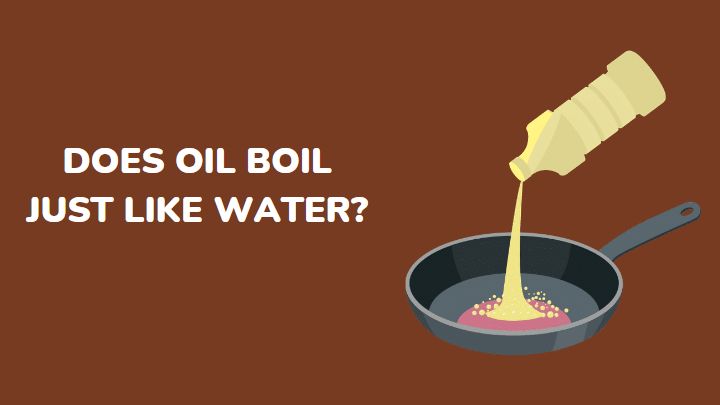If you love frying, you might have asked yourself if oil boils just like water at one point in your cooking journey. This isn’t easy to answer, but in simple terms, oil does boil just like water.
However, oil’s composition and boiling temperature are not the same as water. Neither will you get bubbles (telltale sign of boiling water). And you have to go through lots of smoke to get to that point.
Therefore, can you see oil boil? Is it safe when it boils? These are questions you will get answers to after reading this article.
Does oil boil just like water?
Yes, oil does boil like water. All forms of oil and grease (cooking and others) reach their boiling points, where molecules are broken down too. However, this is hazardous kitchen practice.
Furthermore, the hotter oil gets, the more it changes in viscosity and darkens in color. This change also affects the composition of the fats (also known as free fatty acid) in the oil, which may affect your cooking too.
Therefore, you are advised not to get to this point because it is unsafe to inhale oxidized oil. Moreover, trying to reach the boiling point of your oil would lead to going above the flash point of your oil, where it will likely catch fire.
What is the boiling point of cooking oil?
Generally, cooking oil has a boiling point of up to 500℉ (300℃) or more. However, this differs from oil. Some oils have a lower boiling point than others.
The following are the boiling points of some common cooking oil:
- Vegetable oil – 572°F
- Olive oil – 570°F
- Grapeseed oil – 420°F
- Sunflower oil – 450°F
- Canola oil – 450°F
- Sesame oil – 450°F
- Soybean oil – 572°F
- Coconut oil – 400°F
- Palm oil – 527°F
- Peanut oil – 450°F
- Corn oil – 450°F
- Ghee – 482°F
Does oil boil faster than water?
Yes, it does. Oil boils faster than water because it has a lower heat capacity than water. That is why oil heats faster than water and has a higher boiling point.
The fat molecular structures of oil are denser and more absorbent than water. However, while water vaporizes, oil changes its composition and color.
The low heat capacity of oil also means the hydrogen bonding of the molecules weakens faster. It speeds up molecules breaking for more energy (reacts when in contact with other compounds or matter like water or even meat).
How long does it take for oil to boil?
About 5 to 10 minutes on a medium heat burner. However, this depends on the heat consistency. Nonetheless, when the oil reaches its smoking point, it is not far from its boiling point.
What happens when oil reaches its boiling point?
It changes its appearance. Cooking oil changes its color with a bluish-grey smoke. The color darkens as the free fatty acid alters, changing the viscosity of the oil.
Also, the oil begins to oxidize, burning its energy faster than usual. This chemical reaction also affects the oil and cooking in general.
Does oil boil in water?
Oil and water do not mix. However, oil does not boil in water. These two have varying molecules and compositions, especially boiling capacity. While oil has a low heat capacity, water will boil faster because its boiling point is 212°F (100°C).
Therefore, water boils before oil. The water evaporates and the oil left behind begins to boil.
FAQs
What can make oil boil faster?
Adding salt to oil will make it boil faster. Salt increases the boiling temperature rate, which helps to increase the boiling rate of cooking oil a little bit.
However, heat energy will make oil boil faster. The higher the heat applied to oil, the faster the molecules break down.
Is boiling oil safe to cook in?
It is safe to cook in if unused. Boiling used oil increases toxins (called aldehydes) and fumes from the smoking point. Therefore, the hot oil is unsafe to inhale, but you can cook it with boiled oil.
Will boiling cooking oil burn your food?
Boiled cooking oil will most likely burn your food upon contact. That’s because the oil has reached a high energy level that reacts instantly upon contact with any food.
Does water stop boiling when oil is added?
No, it doesn’t. It works the other way around. The oil traps the vapor of boiling water, thereby reducing the bubbles. However, this does not mean water is not boiling.
The vapor is trapped, and instead, it increases the boiling temperature of the water, leading to it boiling faster.
Why is the smoke point for oil lower than the boiling point?
This is because of the free fatty acid (FFA) present in the oil. The more FFA an oil has, the lower the smoke point of the oil.
Oil can reach its smoke point without getting to its highest boiling point because the FFA is already breaking down and altering its molecules.
Conclusion
You don’t have to worry about your oil reaching boiling point before cooking. However, oil does boil like water.
The bubble might not be present to show signs, but once the cooking oil begins to change color and a bluish-grey smoke is being emitted, it is way past the cooking point.
Oil should not cook beyond 375°F. You can use your thermometer to check this if you are not sure.
However, do not test the limit of your oil. The boiling point of any oil or grease is not only hazardous to the body, but you could also reach the flash point where the oil becomes flammable.
Thanks for reading.
Found this guide helpful? You can read more related articles here on Millenora.

